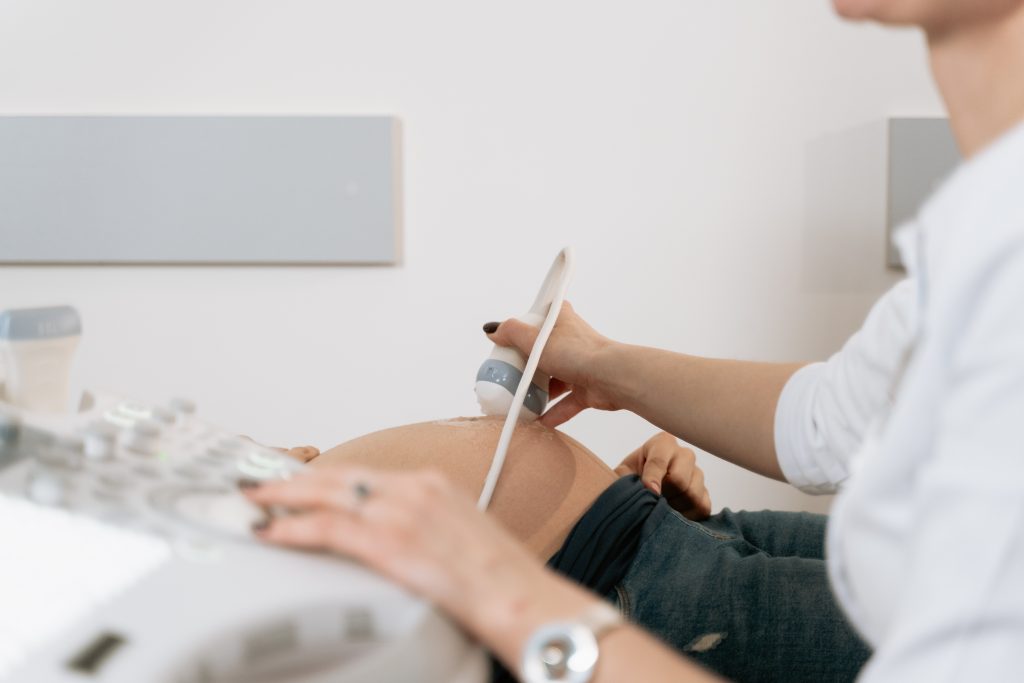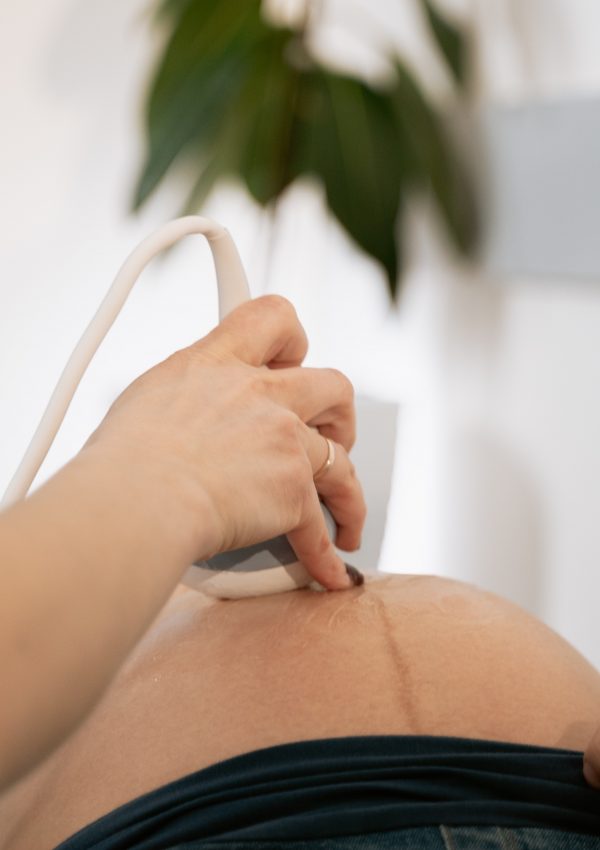Just found out you’re pregnant and wondering what will happen at your first trimester prenatal check-ups? Here is a quick guide on what to expect, including the best questions to ask!
This post may contain affiliate links, which means I’ll receive a commission if you purchase through my links, at no extra cost to you. Please read full disclosure for more information.
Note: This guide is based off of my experience while I was pregnant. It’s meant to simply show you what to expect at prenatal check-ups and should not be taken as medical advice.
Prenatal care is one of the most important steps you can take in order to have a healthy pregnancy. Whether it’s your first pregnancy, or your first pregnancy in a while, you may not know what to expect. Being pregnant is a life-changing experience and you want to make sure you’re as healthy as you can possibly be for your little one.
The first trimester may feel like the shortest trimester because most women don’t find out they’re pregnant until almost halfway through. Even though it may feel like the shortest, the prenatal appointments are the longest and the most in depth. Here the ultimate guide of what to expect at your first trimester prenatal check-ups.

This post is all about what to expect at your first trimester prenatal check-ups.
What is prenatal care?
Prenatal care is another word for the healthcare that you receive while you’re pregnant. It is a preventative form of healthcare, where the doctor or midwife monitors both you and the baby (or babies). The main goal of prenatal care is to ensure that both mom and the baby are healthy.
RELATED POST: 11 Things To Do Once You Get A Positive Pregnancy Test
How long is the first trimester?
The first trimester is from weeks 1 through the end of week 13. To find out how far along you are, you need to know the first day of your last period and how long your cycles tend to be. Then you can plug that info into an online calculator like this one.
Pregnancy is actually 40 menstrual weeks starting from the first day of your last period. For example, if the first day of your last period was 6 weeks ago, you could be 6 weeks pregnant. The reason pregnancy is calculated based off of your last period and not conception date, is because it’s more accurate.
Bear in mind that only about 4% of babies are born on their due date. Calculating the due date is more-so to have a ballpark estimate of when the baby will arrive and to monitor the growth and progress.
How many prenatal check-ups do you have in the first trimester?
If you are not considered high-risk, you will likely have prenatal check-ups every 4 weeks.
So if you do the math, you may only have 2 or 3 visits throughout your whole first trimester.
Every practice does their prenatal care differently so you may go more or less than that. You just want to make sure you’re seeing a doctor that makes you feel well taken care of no matter how many visits you have.
First Prenatal Check-Up
Like I said above, every practice does their prenatal care differently. Overall, you can expect your first check-up to be somewhere between 6 and 12 weeks. The appointment may be long so be sure to plan for a couple hours. At your first visit you can expect the following:
- Weight check, blood pressure check, urine sample: The first things your caretaker may do is take your weight, blood pressure, and a urine sample. These three measures will likely be done at every prenatal visit throughout your whole pregnancy.
- A confirmation of your pregnancy: Your doctor or midwife will confirm your pregnancy through a urine test. If for any reason your urine test comes back negative, they may confirm your pregnancy with blood test. Blood tests can detect smaller amounts of hCG, which is a hormone only produced during pregnancy.
Questions your doctor will ask at your first trimester prenatal check-ups
Your doctor or midwife will ask plenty of questions about your health history as well as questions about what medications you’re currently taking. Here are some specific topics that would be a good idea to prepare for:
General medical history
If you’ve had any major surgeries, or major injuries, it would be a good idea to note those. Other common health problems to take note of are diabetes, high-blood pressure, cancer, asthma, etc. You can never give too much information, only too little.
Family medical history
You will want to take note of any genetic disorders or any medical conditions that run in your family. This includes your partners medical and family history too. Your doctor will want to know everything.
Obstetrical history
Your doctor will likely want to know if you’ve ever been pregnant before. In addition, they will want to know if you’ve had a history of miscarriage, preterm birth, abortion, etc. Really, anything about your history that has to do with birth or pregnancy.
Fertility history
If you have a history of PCOS (polycystic ovary syndrome), endometriosis, or any other medical issues that would have impacted your fertility, be sure to mention them. Also, if you went through fertility treatments like IVF, IUI, or others, your doctor will likely want to know about them too.
Lifestyle habits
They will want to know all of your business about whether you do drugs, smoke, and drink. Other lifestyle habits include how often you exercise, how much sleep you get on a regular basis and so on.
Dietary habits
It would be a good idea to make a quick note of what you eat regularly (home-cooked vs. takeout, etc.) and how many meals a day you eat. Caffeine intake is also a good one to write down.
Mental health
Mental health is really important and you want to make sure you’re upfront and honest here! There’s a huge stigma around mental health and unfortunately postpartum depression is common. You will want to make sure you give your doctor all the info they need to help you.
Medications
Lastly, you will want to take note of all medications you’re currently taking, which includes any herbs and vitamins.
Questions you should ask at your first trimester prenatal check-ups
Just as your doctor or midwife will have plenty of questions for you, you should also have plenty of questions for them. Here are some good ideas of what to ask:
- What foods are best to eat or avoid?
- Do you have any prenatal vitamin recommendations?
- Should I exercise? What are safe exercises?
- Are there any prenatal classes I should consider taking?
- What lifestyle changes should I make?
- Do you recommend genetic screening based on my family’s medical history?
- How can I manage morning sickness?
- What are common first trimester symptoms?
- When should I call you? What symptoms indicate that something is wrong?
- Can I travel?
- What medications should I stay away from while pregnant? What medications are safe?
First Trimester Standard Tests
You will have many different tests done throughout your pregnancy but there are some that are specific to just the first trimester. The tests listed below may be done at your first prenatal visit but some practices may wait to do them when you’re farther along:
Blood draws
When the doctor draws your blood, they will do many different types of blood tests such as a CBC (complete blood count), blood type, diabetes, rubella, and Rh type.
A complete blood count is a test that gives your doctor insight into your overall health by looking at different components of your blood. It’s a good indicator of anemia or possible infection.
The blood draw will also test for your blood type, which will either be O, A, B, or AB. In addition, depending on risk factors, you may be tested in your first or second trimester for diabetes.
Next, they may test for Rubella, which is known as the ‘German measles’. It can be very harmful to your baby if you’re infected. Most people were vaccinated as children so it’s not a huge cause for concern.
And lastly, your Rh (Rhesus) type is either positive or negative. The doctor will test for this because if you’re negative, and there’s a chance your baby is positive, antibodies can form which could be harmful for both you and the baby. Your doctor will end up giving you an injection to prevent this at some point during your pregnancy.
Pelvic exam and pap smear
A pelvic exam is a short exam where the doctor will physically examine your pelvic area and check for signs of infection. They will also do a pap smear which is a quick swab that tests for cervical cancer. And finally, while they’re doing these two tests, they will also test for bladder infections or STDs.
Follow-Up Prenatal Check-Ups
At all prenatal check-ups, you can be sure that your doctor or midwife will do some, if not all of these things listed below:
- Check your weight: Your doctor will want to make sure to monitor your weight throughout your entire pregnancy. The average weight gain for a single pregnancy is 25 to 35 pounds and only 5 pounds in the first trimester.
Every woman is different so you can gain more or less than that. What matters is that your doctor gives you the OK that everything is fine. Rapid weight gain could be an indication of preeclampsia or gestational diabetes which is why it’s so closely monitored.
- Check your blood pressure: Like your weight, your blood pressure will also be closely monitored throughout your pregnancy. It’s monitored because high blood pressure could also be an indication of preeclampsia. Your caretaker will want to know about that immediately and take necessary precautions.
- Take a urine sample: A urine sample can test for sugar and protein. Too much sugar in your urine could mean that you have gestational diabetes and too much protein could be an indicator of preeclampsia. These routine checks may seem small but they’re always testing for larger issues, which is better for you and baby in the long run.
- Check the fetal heart rate with a doppler: Toward the end of your first trimester a tool called a doppler should be able to pick up the fetal heart rate. They will check to make sure the heart rate is not too fast or too slow and it’s usually done pretty quickly.
- Measure your fundal height: Your fundal height is basically just a measurement of how big your belly is getting. It’s done using an ordinary tape measure in most cases. Not all doctors do it but it could give an idea of fetal growth without doing an ultrasound.
Ultrasounds
In your first trimester, you may only have one ultrasound if you’re not high-risk. The ultrasound you get is also known as a ‘dating ultrasound’, which is where they will give you an official due date. Depending on when you have this ultrasound, you may be able to see a heartbeat!
Your ultrasound may be pelvic or transvaginal so be sure to ask if you prefer one over the other. Since some practices won’t see you until toward the end of your first trimester, some women opt do ultrasounds at an ultrasound clinic. For these, you can pay out of pocket and have one done by an ultrasound tech.
Optional Tests
The main type of optional tests offered throughout pregnancy are genetic screenings. The genetic screening will test for multiple genetic disorders at once. There are different types of genetic screenings but they all test for the same things, more or less:
- NIPT (Non-invasive prenatal testing): The NIPT is one of the best to do during pregnancy because it has no risk of miscarriage and has high detection rates. It’s just a simple blood draw that takes a few minutes.
Just a heads up, you may be able to find out what the sex of the baby is when you do this test. So if you are team green, be sure to let your doctor know beforehand.
- CVS (Chorionic villus sampling) is a genetic test that is sometimes offered to women who are over 35. To conduct this test, the doctor will take a swab of the placenta. It is very accurate but has a high risk of miscarriage (1 in 200).
- NT (nuchal translucency) is an ultrasound that measures the length of the baby’s neck and specifically tests for Down Syndrome. It’s roughly 60-80% accurate.
This post was all about what to expect at your first trimester prenatal check-ups.




